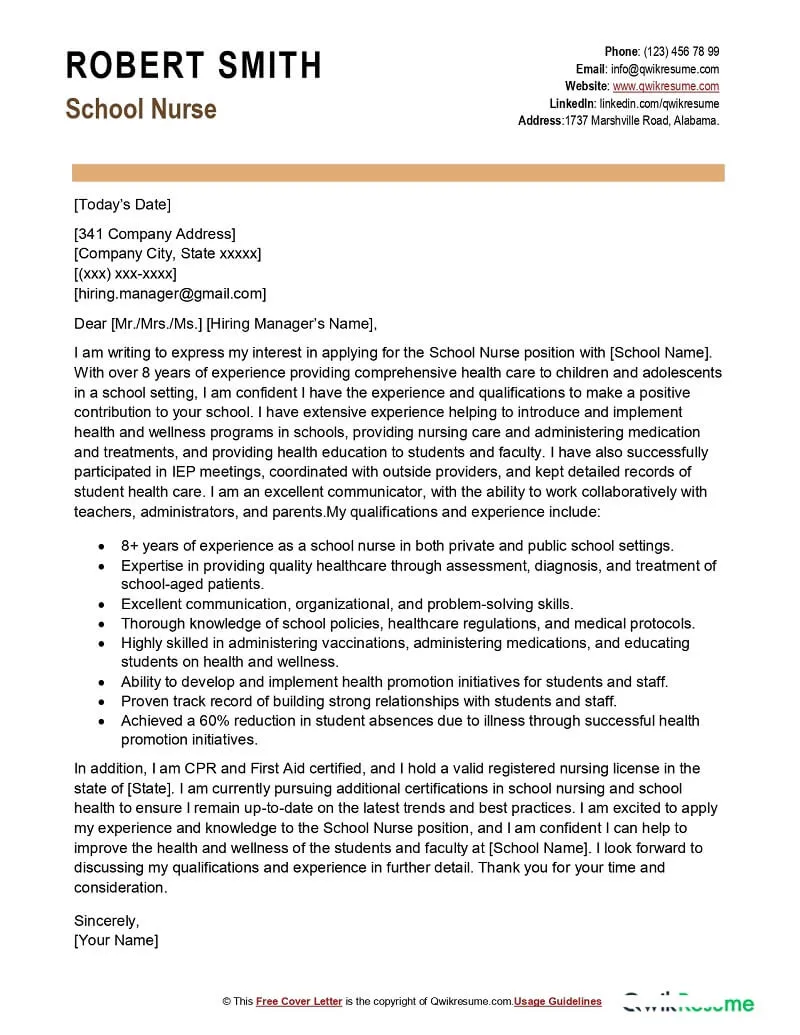Understanding the School Nurse Role
A school nurse is a vital healthcare professional who plays a critical role in the well-being of students within an educational setting. Their responsibilities extend beyond simply treating illnesses and injuries; they encompass health education, preventative care, and the overall promotion of a healthy school environment. Understanding the multifaceted nature of this role is the first step in crafting a cover letter that effectively highlights your qualifications and demonstrates your suitability for the position. This understanding allows you to tailor your application to showcase the skills and experiences most relevant to the specific needs of the school district or individual school you are applying to. The role demands a unique blend of clinical expertise, communication skills, and a genuine passion for working with children and adolescents, all of which should be reflected in your cover letter.
Key Responsibilities of a School Nurse
The daily tasks of a school nurse are diverse, encompassing everything from emergency response to long-term health management. Your cover letter should showcase how well you understand these responsibilities and are prepared to meet the challenges they present. Highlighting your experience and skills in these areas will immediately signal your competency to potential employers. Be sure to quantify your achievements whenever possible. For example, instead of saying you managed student health records, mention how many records you maintained or any improvements you implemented to streamline the process. This kind of specific information can make your cover letter much more impactful and memorable, setting you apart from other candidates.
Providing First Aid and Emergency Care
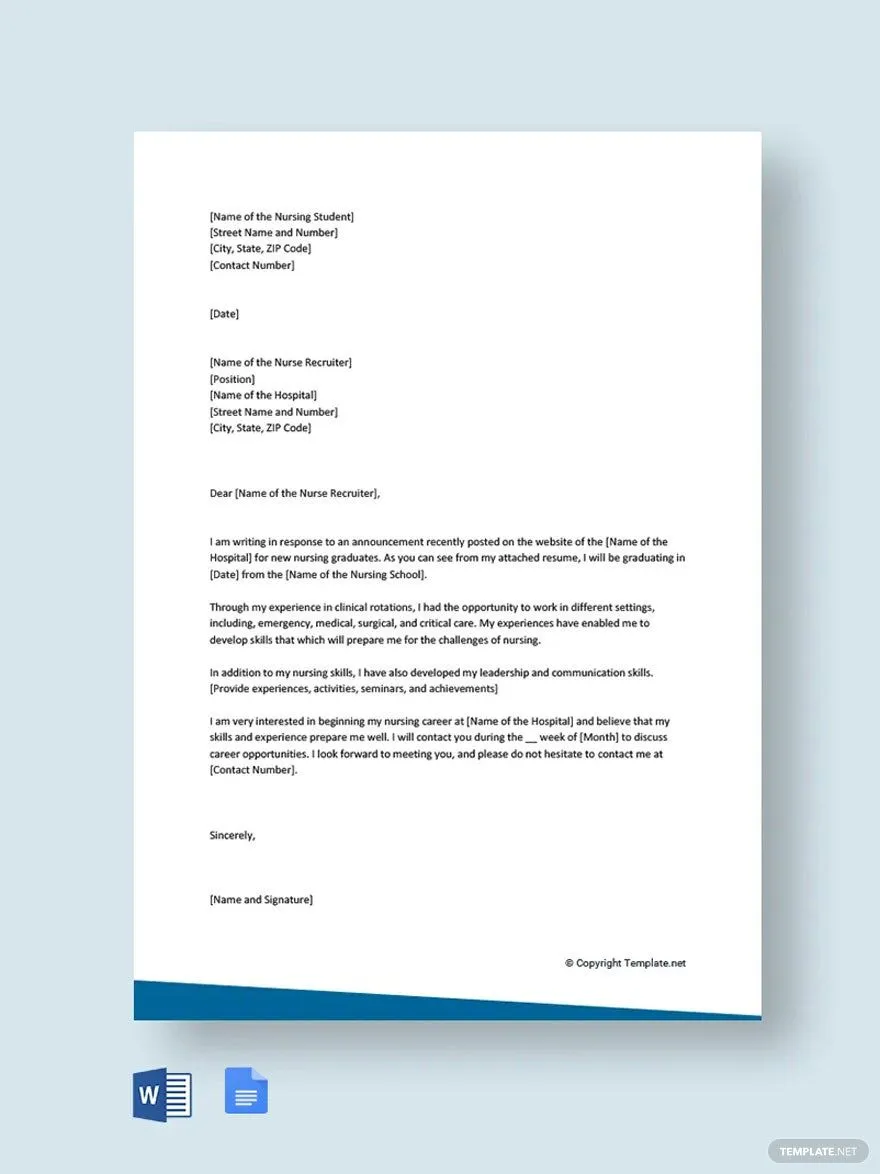
A significant part of the school nurse’s job involves responding to medical emergencies and providing immediate care to students and staff. This includes assessing injuries, administering first aid, and coordinating with emergency medical services when necessary. Your cover letter should clearly state your certifications, such as CPR and First Aid, and provide examples of your experience in handling emergency situations. Schools want to know that you can remain calm and effective under pressure, ensuring the safety and well-being of everyone on site. Describing a specific instance where your quick thinking and decisive action made a positive impact can greatly impress the hiring manager and highlight your skills.
Managing Student Health Records
Maintaining accurate and confidential health records is crucial for ensuring appropriate care and complying with legal regulations. This involves collecting, organizing, and updating student health information, including immunization records, medical histories, and medication administration logs. Mention your experience with electronic health record systems, if any, and your understanding of HIPAA regulations. Schools value nurses who are organized, detail-oriented, and capable of managing sensitive information with discretion. Highlighting your proficiency in record-keeping systems and your commitment to patient privacy will make you an attractive candidate. If you have experience with specific software used by the school district, be sure to mention it.
Administering Medications and Treatments
School nurses are often responsible for administering medications, providing treatments, and managing chronic health conditions for students. This requires a thorough understanding of pharmacology, proper administration techniques, and the ability to monitor for adverse reactions. In your cover letter, detail your experience with medication administration and any specialized training you possess, such as insulin pump management or asthma care. Emphasize your ability to communicate effectively with students, parents, and healthcare providers to ensure safe and appropriate care. Highlighting these skills demonstrates your commitment to providing comprehensive and compassionate healthcare to students. Provide examples of how you have helped students manage their health conditions while in school.
Crafting Your School Nurse Cover Letter
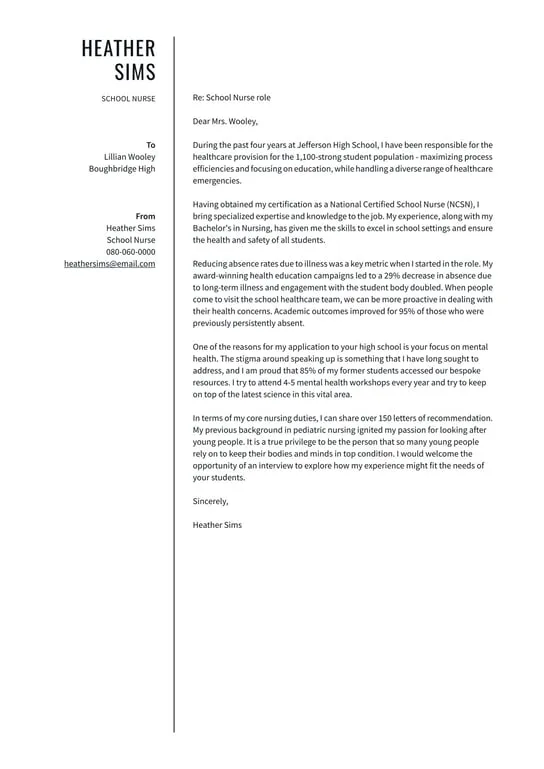
Writing a strong cover letter is crucial for making a positive first impression. It’s your chance to showcase your skills, experience, and passion for school nursing in a way that complements your resume. A well-written cover letter grabs the attention of the hiring manager and convinces them that you’re the right fit for the position. It’s not just about listing your qualifications; it’s about demonstrating how your unique skills and experiences align with the specific needs of the school or district. Your cover letter is your opportunity to set yourself apart from other candidates and highlight what makes you the ideal choice. Make sure to tailor your letter to each position to increase your chances of success.
Header and Contact Information
Start with a professional header that includes your full name, address, phone number, and email address. Also, include the date and the hiring manager’s name and title, if known. Using a professional format shows attention to detail. Correct formatting sets a professional tone and shows that you can follow instructions. Be sure to double-check all the information to ensure accuracy and avoid any typos. A well-formatted header instantly gives a positive impression and demonstrates your professionalism. If you are applying for a specific position, make sure to include the job title and posting number, if applicable.
Formatting Your Cover Letter
Choose a clean and easy-to-read font, such as Times New Roman, Arial, or Calibri, and use a font size between 10 and 12 points. Use standard margins (1 inch on all sides) and single-space the body of your letter, with a blank line between paragraphs. Proper formatting makes your letter look polished and easier to read. Avoid overly elaborate fonts or formatting styles, as they can distract from the content. Use bullet points or numbered lists to highlight key skills and accomplishments. Keep paragraphs concise and to the point. Your goal is to make it easy for the hiring manager to quickly grasp your qualifications. Good formatting enhances readability and makes your application more appealing.
Writing a Compelling Opening
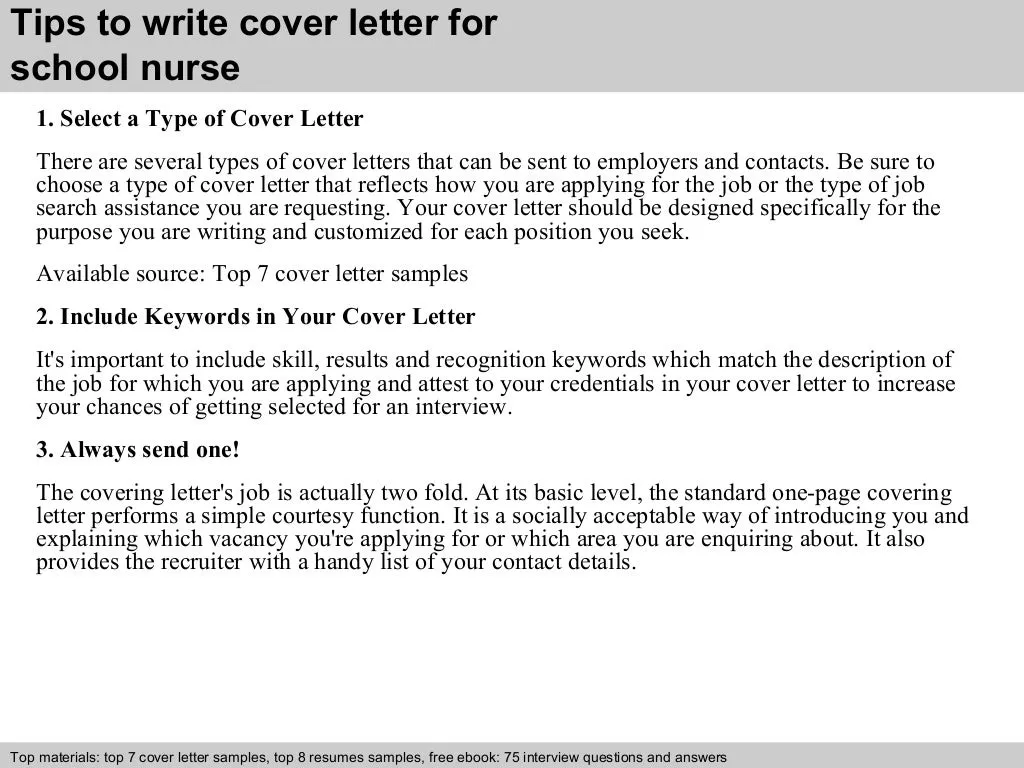
Your opening paragraph is crucial for capturing the reader’s attention. Start by stating the position you are applying for and where you saw the job posting. Briefly explain why you are interested in the role and what attracts you to the school or district. You might include a brief anecdote or statement that shows your passion for school nursing. Avoid generic openings. Instead, personalize your introduction to show your understanding of the school’s mission and values. State what makes you excited about the opportunity. A strong opening immediately grabs the reader’s attention and sets the tone for the rest of your letter, showing why you are interested in the position and why you are a good fit. This is your first chance to impress the hiring manager.
Highlighting Your Skills and Experience
The body of your cover letter is where you showcase your relevant skills and experience. Review the job description carefully and identify the key requirements. Then, provide specific examples of how your skills and experiences align with those requirements. Use action verbs to describe your accomplishments and responsibilities. Instead of simply stating that you administered medications, you might say “Administered medications to over 50 students daily, adhering to strict protocols and ensuring accurate dosage.” Quantify your achievements whenever possible to demonstrate the impact of your work. For example, instead of saying you improved student health outcomes, mention a percentage improvement or specific examples of positive changes. Use this section to highlight your most relevant qualifications and why you’re the ideal candidate.
Emphasizing Relevant Certifications
Make sure to list all relevant certifications, such as CPR, First Aid, and any advanced certifications you hold. If you have specialized certifications in areas like asthma management, diabetes care, or pediatric advanced life support (PALS), be sure to mention them. Also include any specific training or courses you have completed that are relevant to the school nurse role. Schools prioritize candidates with up-to-date certifications and specialized skills. Listing these details immediately builds credibility. Mentioning these certifications demonstrates your commitment to professional development and your readiness to provide high-quality care to students.
Demonstrating Your Passion for School Nursing
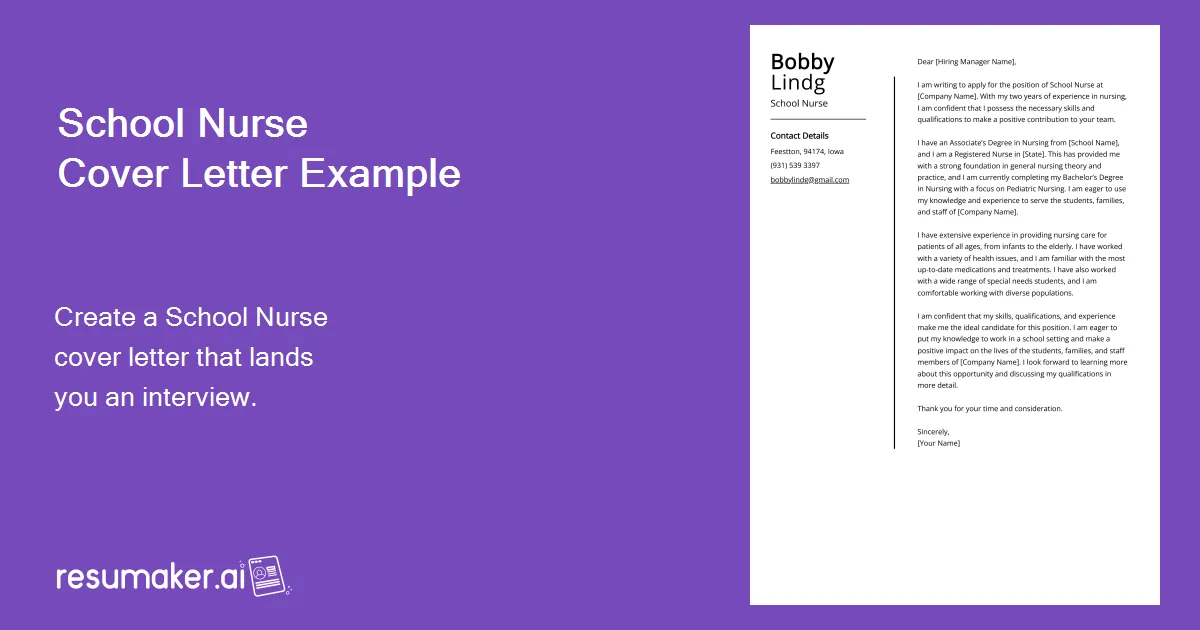
School nurses need to be passionate about working with children and promoting their health and well-being. In your cover letter, express your genuine enthusiasm for the role. Describe why you enjoy working with students and what motivates you to provide excellent care. You might share a brief story or anecdote that illustrates your commitment to school nursing. Highlight your understanding of the unique challenges and rewards of working with children and adolescents. Show that you appreciate the opportunity to make a positive impact on students’ lives. Your passion will set you apart from other applicants. This makes you sound more relatable and like someone the hiring manager would want to work with.
Showcasing Your Soft Skills
In addition to clinical skills, school nurses need strong soft skills, such as communication, empathy, and problem-solving. Provide examples that demonstrate these qualities. For instance, describe a time when you successfully communicated with a student’s parents to resolve a health issue. Showcase your ability to work collaboratively with teachers, administrators, and other healthcare professionals. Mention your ability to remain calm under pressure, manage multiple tasks, and adapt to changing situations. Soft skills are essential in school nursing. Highlight your skills in a way that shows you understand the importance of working as a team, communicating effectively, and caring for students in a school environment. These skills help you to create a safe environment for children.
Structuring the Body Paragraphs
Organize your body paragraphs logically, focusing on different aspects of your skills and experience. Use a clear structure, with each paragraph addressing a specific point. Consider using the STAR method (Situation, Task, Action, Result) to describe your accomplishments. For each example, briefly describe the situation, explain the task you were assigned, detail the actions you took, and highlight the positive results. This method provides a clear and concise way to showcase your achievements. Each paragraph should build upon the previous one, creating a cohesive narrative that demonstrates your suitability for the position. Using this structure will make it easier for the hiring manager to read and understand your qualifications. Use action verbs to make your points more impactful.
Adding a Strong Closing
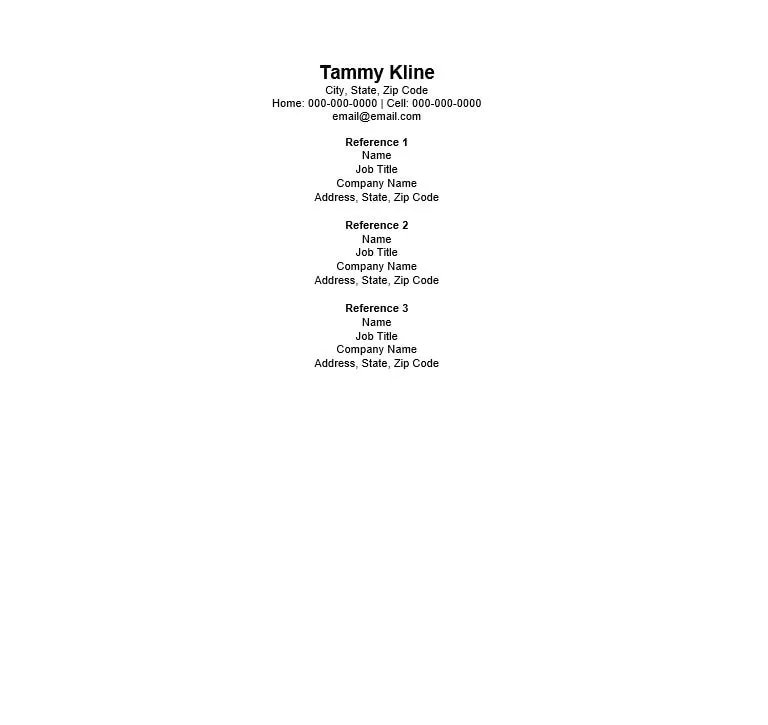
End your cover letter with a strong and confident closing statement. Reiterate your interest in the position and express your enthusiasm for the opportunity to contribute to the school community. Thank the hiring manager for their time and consideration. State that you look forward to hearing from them. Include a call to action, such as stating that you are available for an interview at their earliest convenience. Reiterate your enthusiasm for the position and express your eagerness to learn more about the opportunity. Your closing statement should leave a lasting positive impression and reinforce your suitability for the job. This section is your final chance to make a positive impression and encourage the hiring manager to call you for an interview.
What to Avoid in Your Cover Letter
There are several common pitfalls to avoid when writing a cover letter. These mistakes can undermine your application and decrease your chances of getting an interview. Being aware of these common mistakes can significantly improve the quality of your cover letter. Make sure to review your cover letter carefully to avoid these errors. Avoiding common mistakes is essential for making a positive first impression and increasing your chances of success. Always remember to proofread your letter carefully and make sure your personality shines through.
Common Mistakes to Sidestep
One of the most common mistakes is using a generic cover letter that is not tailored to the specific job or school. Avoid using a template without customizing it to the position. Another common issue is focusing too much on your own needs rather than highlighting how you can benefit the school. Avoid making your cover letter all about yourself. You should focus on demonstrating how your skills and experience can meet the needs of the school district. Also, avoid being overly wordy or using jargon that is not accessible to a general audience. Make sure to be clear and concise. Keep your cover letter focused on the most important information and provide specific examples to support your claims. Make sure your tone is professional and positive throughout.
Ignoring the Specifics of the School
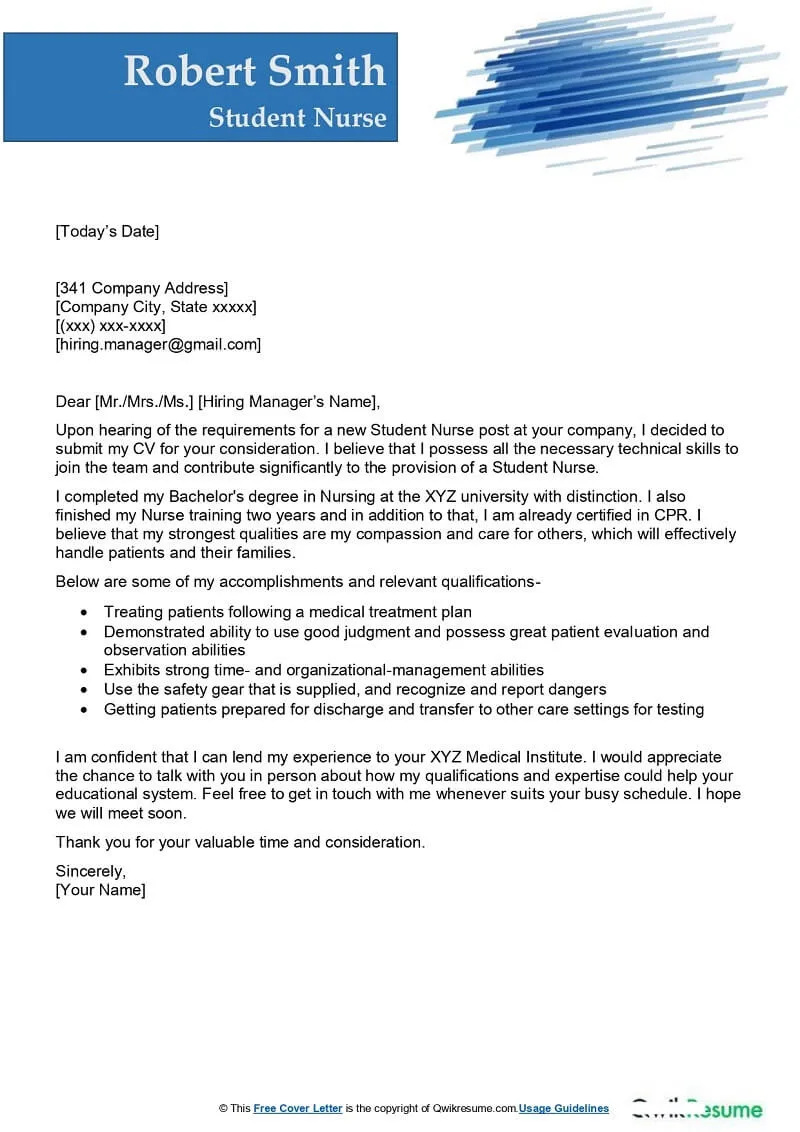
Failing to research the school and tailor your cover letter to its specific needs and values is another critical error. A generic cover letter suggests a lack of interest in the position. Research the school’s mission, programs, and any specific requirements outlined in the job description. Show that you understand the school’s needs and how you can contribute to its success. Referencing specific programs or initiatives that resonate with you demonstrates that you have taken the time to learn about the school and are genuinely interested in the role. Research the school’s website to identify any specific initiatives or values. Show that you understand what makes the school a great place to work. Use keywords from the job description to show you are the right fit for the position.
Failing to Proofread
Errors in grammar, spelling, and punctuation can make a negative impression. Before submitting your cover letter, proofread it carefully. Always read your cover letter out loud. Ask a friend or colleague to review it for you. Make sure to use spell check and grammar check tools, but also carefully review the document yourself. Pay attention to sentence structure, clarity, and tone. Ensure your cover letter is free of errors. Proofreading shows attention to detail and professionalism. A poorly written cover letter can significantly reduce your chances of getting an interview. Make sure to revise and review every aspect of your cover letter. Ensure the document is free of all errors and ready for review.
Finalizing and Submitting Your Cover Letter
Once you have written your cover letter, it’s important to take the final steps to ensure it is polished and ready for submission. These steps involve thorough proofreading, editing, and following up. Make sure you’ve taken these steps to ensure you’re submitting a high-quality application. Finishing touches make a huge difference in the application process. These steps will help you present your application in the best possible light, boosting your chances of landing your dream job. Taking the time to complete these final steps can significantly increase your chances of success. Proofreading ensures that your cover letter is free of errors, which can leave a lasting, positive impression.
Proofreading and Editing
Proofread your cover letter meticulously. Check for any errors in grammar, spelling, punctuation, and formatting. Read the letter aloud to catch any awkward phrasing or unclear sentences. Make sure the tone is professional and consistent throughout. Edit your cover letter to ensure that it is concise, clear, and easy to read. Remove any unnecessary words or phrases. Ensure that your key accomplishments and skills are highlighted effectively. Review your cover letter multiple times, preferably on different days. Proofread your cover letter one more time to ensure there are no errors or inconsistencies. Proofreading ensures that your cover letter is polished and professional.
Submitting Your Cover Letter and Resume
Carefully follow the application instructions. Submit your cover letter and resume in the required format. Make sure your documents are properly named and saved as requested. Submit your application before the deadline. Double-check all the information to ensure that it is accurate. If submitting electronically, make sure your files are compatible with the system. Following all instructions shows attention to detail and respect for the hiring process. Verify all information and attachments before submitting your cover letter and resume to make sure that you’re ready. You can submit your cover letter and resume knowing that your application is professional and complete.
Following Up
After submitting your application, it’s acceptable to follow up with the hiring manager. Send a brief email or make a phone call to express your continued interest in the position and to inquire about the status of your application. If the job posting provides a timeframe for a response, wait until that time has passed before following up. Keep your communication brief and professional. Expressing your enthusiasm and reconfirming your interest can remind the hiring manager of your application. However, avoid excessive follow-up as it can be seen as intrusive. A timely and professional follow-up can show your continued interest and enhance your chances of success. Thank the hiring manager for their time and consideration once again.
